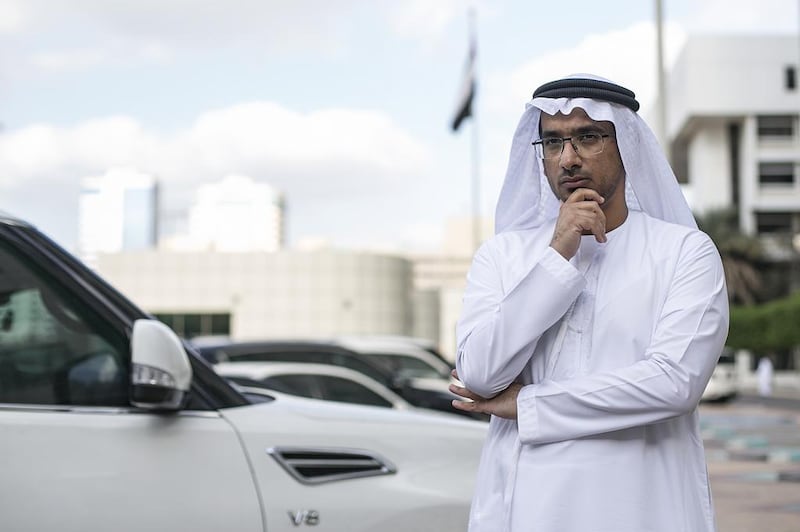To thrive in the 21st century, societies need their innovators. But how best to support the most creative Emirati minds and turn their ideas into workable and eventually profitable products?
Last month, the Abu Dhabi Department of Economic Development (Added) launched the Innovators Support Council (ISC), to iron out the obstacles Emirati inventors face when registering and marketing their innovations.
It was attended by representatives from companies keen to support budding innovators, such as UAE University, Adnoc and the Masdar Institute.
Also present were individual Emirati inventors who have partnered with the Takamul Programme, an initiative that partly funds patent applications, provides legal assistance and takes steps to make Emirati inventions commercially viable.
Among them was the youngest inventor on Takamul’s books, 16-year-old Khalifa Al Remeithi, who already has a string of inventions to his name including a high-tech attendance-monitoring device that is already being applied at his school, Emirates National School in Abu Dhabi.
With Takamul’s help, Khalifa has also recently registered a patent for another invention: the Eye Zone Safe System, a device that discourages children from sitting too close to television screens.
“I have younger sisters at primary school who love sitting too close to the TV, which can result in eye strain and fatigue or headaches,” he explains. “My father and I are always yelling at them to move away.”
Khalifa realised there was another way to approach this problem when he was only 13. He toiled away for three months in his lab at home to come up with an answer.
“With the device I’ve invented, if a child comes too close to the TV the display changes and shows a message to please move back. Once they have moved back a safe distance, the device will resume playing the video. The difference between this and any other device that already exists is that my device doesn’t damage the TV in the process.”
The teenager and his parents approached Takamul, who arranged a meeting with an intellectual property lawyer. They prepared the patent application and filed it in the United States, arguably the main global market for technology-related products. “We were told four months ago that it is now registered, although we’re still waiting for the official release,” says the young inventor. “After I get the publication document, that means I can go ahead, approach companies, and find investors.”
Khalifa is often asked if his invention can be used with iPads or smartphones. “Not yet is the answer,” he says. “But possibly in the future.”
Another inventor assisted by Takamul, and also at ISC’s first meeting, is Salem Ali bin Kenaid, a 33-year-old Emirati IT software entrepreneur who has spent eight years developing an automatic parking management system.
Mr bin Kenaid came up with his concept after watching parking inspectors working in the summer heat. He surmised that he could develop his own technology to offer a more efficient alternative.
“What I’ve come up with is basically a GPS with other sensors, which is fixed into a car and communicates with a device in a parking lot,” says Mr bin Kenaid, who lives near Al Shahama. “As soon as you park, you automatically get charged for parking and the fee keeps being added hour by hour.”
Takamul helped Mr bin Kenaid get his idea patented. “It’s actually a collection of patents detailed to cover all aspects of infringement rights in the US,” he explains. “So when my technology is applied, hopefully I will get royalties.”
For the initial prototype to work, government bodies would have to get on board to implement the system. But Mr bin Kenaid is also working on a more commercial option, again enlisting the help of Takamul.
“This will have a similar parking feature, as well as others, such as geofencing. I’ll be submitting it formally for patenting very soon and I’m launching a company later this year.”
Since the Dubai Government set a target to make 25 per cent of all journeys driverless by 2030, Mr bin Kenaid sees technological advancements such as his own as inevitable. “All autonomous cars have these kinds of features built into them as well as cameras, radar and other systems, so this technology is already well on the way. The question is not if but when,” he says.
The Takamul programme has supported 186 patents since it started up in 2007, covering industries spanning clean energy, electronics and health care, as well as oil and gas. In 2013, the programme widened to support inventors across the UAE, rather than just those based in Abu Dhabi. As a result, the number of patents supported by Takamul has shot up, from 13 in 2011 to 31 in 2016. Forty more applications are currently awaiting completion.
The brainchild of the now-dissolved Abu Dhabi Technology Development Committee, the programme is now sponsored by Added, whose acting undersecretary, Khalifa bin Salem Al Mansouri, says he hopes the ISC will provide innovators with the necessary assistance to achieve economic and social value for their inventions.
“It is set to be one of these key platforms that aims to support innovation,” he says.
business@thenational.ae
Follow The National's Business section on Twitter





